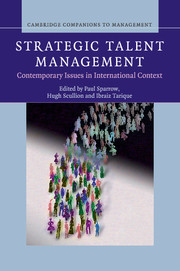Foreword
Published online by Cambridge University Press: 05 July 2014
Summary
Foreword
In any gathering of human resources professionals today their conversation is dominated by questions of strategic talent management. These professionals and their executives want to know how they can more effectively acquire and manage the talent their organizations need to meet their current client and customer needs, as well as be staffed for the demands they expect to be facing. This is without question the most pressing practical challenge in human resources management today throughout the world. However, this cacophony of practical questions and ad hoc advice makes it difficult to know what to trust. People use the word “talent” to mean very different things. For example, does talent management refer only to elite employees, or is every employee in the organization talent? Further, is talent management just old human resources management under a new name? Such questions, and the circumstances that make any one approach useful or not, are not well understood. Scholars have only recently begun to provide the clarity and coherence necessary to the effective application of strategic talent management in organizations, as is reflected in the numerous recent journal special issues on the topic. However, such collections of divergent perspectives do nothing to bring coherence to the subject.
Here Paul Sparrow, Hugh Scullion, and Ibraiz Tarique address this challenge by collecting the growing body of systematic research and integrating it into a coherent framework. Making a compelling case that talent management places strategy at the center of employee hiring and management retention, and that there is a range of useful innovations and programs, developing one strategy is the driving objective. This volume makes it clear there is indeed something new and important happening under the umbrella called strategic human resources management. Yet this book does not shy from addressing the competing ideas and interpretations of talent, but lets the disputants make their cases in their own words. The editors then go on to explain where each perspective has the most value, using the differences to explain and illustrate rather than taking any one perspective and seeking to impose it on others. This volume contains contributions from (and has value to) those in fields as diverse as strategy, organizational learning, organizational behavior, marketing, supply-chain management, as well as human resources management. Further, it has a global focus, recognizing that the most challenging talent management is in far-flung global firms and non-governmental organizations.
- Type
- Chapter
- Information
- Strategic Talent ManagementContemporary Issues in International Context, pp. xvii - xviiiPublisher: Cambridge University PressPrint publication year: 2014



